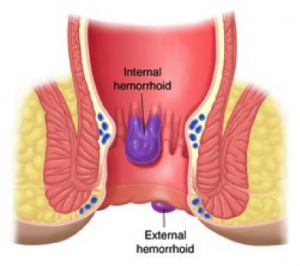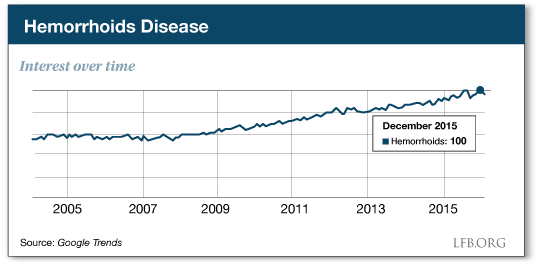
Did Hemorrhoids Take Down the French Empire?
- Napoleon’s struggle with a well-known medical condition may have rendered him useless to his army
- 75 percent of all people may find themselves enmeshed in a battle with this uncomfortable condition during their lifetime
- Don’t let pain and discomfort change the course of your history. Find out how to prevent it with these easy tips
Dear Reader,
Picture it.
It’s a warm June day in Europe. You can feel the pounding of horse hooves shaking the ground beneath you and smell the cannon fire hanging in the air. You sink deeper into sullen feelings as you hear the sounds of swords making contact and men screaming as they meet their fate on the battlefield. You are forced to lie paralyzed by great pain in your commander’s tent — knowing you are in too much pain to help your army as they continue to battle the British and Prussian armies.
Suddenly, a high-ranking French officer bursts into your tent and demands you mount your horse and go survey the battlefield.
“We need you out there! It’s the only hope we have to win, sir!” he screams.
You try to stand up. But, you fall right back down. The pain, burning, bleeding, and itching are just too intense for you to go on. As you lie in the tent, you know that you have lost not only this battle, but your reign as emperor of France.
In this scenario, it’s June 18, 1815, and you are Napoleon Bonaparte. You have just succumbed to defat in the Battle of Waterloo.
And the reason why you couldn’t mount your horse to survey the battlefield? Or help your men stave off the advances of the enemy? Or defend your title as the emperor of France?
Because your body is already at war. And not with opposing military forces, but with a hellacious bout of hemorrhoids (also called piles).
That’s right. According to some historians, Napoleon may have lost the Battle of Waterloo due to an extreme case of piles.2

An accurate portrait of Napoleon at Waterloo — standing while in visible pain.
Photo Credit: sainthelenaisland.info
It’s pretty shocking to think such a common, slightly embarrassing condition may have changed the course of history.
But when faced with the fact that 75 percent of people will suffer from hemorrhoids at some point in their lives, it doesn’t seem so far-fetched.2
Today, Living Well Daily is going to lead your through the facts about hemorrhoids. We will discuss what hemorrhoids are, how they are formed, and, most importantly, how to prevent them from becoming your personal Battle of Waterloo.
![]() The Battleground in Your Body
The Battleground in Your Body
Have you gone to the bathroom and found blood in the water when you’re done? Or experienced itching, burning, pain, and pressure of the rectum?
These are the common symptoms of hemorrhoids. And if none of this sounds familiar now, as I mentioned above, you have three in four chance of experiencing at some point in your life.
If you are over age 50, there is a one in two chance that you already have.2
You may be wondering by now: What exactly are hemorrhoids? Let me explain…
Located just under the lining of the bottommost portion of the anus and the rectum, there is a network of soft veins. When these veins become enlarged and inflamed (usually cause by pressure), it creates a hemorrhoid. Hemorrhoids come in two different varieties, internal and external.

Figure 1 Photo credit: webnat.com
Internal hemorrhoids happen in the lower rectum. While internal hemorrhoids are typically painless, they can produce bleeding than can be seen in the toilet bowl on or on toilet paper after a bowel movement. However, if an internal hemorrhoid becomes prolapsed (when the vein protrudes beyond the anus) it can cause irritation or itching at the site.3
External hemorrhoids can cause pain because they develop under the skin near the anus. In fact, this type of hemorrhoid compromises the skin and causes irritation, and sometimes results in a blood clot. If a blood clot forms, it can cause extreme pain along with a lump close to the anus.3 If Napoleon did have hemorrhoids, it was likely this type.
Hemorrhoids can be caused by any type of added pressure on your blood vessels. This includes actions like straining you muscles during bowel movements, pregnancy, obesity, sitting for long periods of time on the toilet, and improper diet.
And while hemorrhoids already disrupt the lives of over 10 million Americans at any given time, Google Trends indicate this number could be increasing.

America’s interested has almost doubled over the last 10 years.
When I did a trend search, I found that Google searches for “hemorrhoids” has come close to doubling in the last 10 years.
In fact, hemorrhoids was the most searched health term on Google from 2012–2014.4
While factors like growing computer use and competency may play a role in this climbing number, it may also indicate that lots of cases of hemorrhoids going unreported.
The rapid increase in obesity may also be to blame here. Extra weight on the body can result in restricted blood flow and increased pressure on blood vessels. This added pressure can compromise vein strength and cause the veins to erupt. Obesity is also linked to sedentary lifestyle, poor eating habits, low levels of physical exercise, and irregular bowel movements, which is the main source of hemorrhoids growth.5
Even though it may seem inevitable that you will experience your personal Battle of Waterloo with hemorrhoids, there are a few ways to keep them at bay.
Exercising for 20–30 minutes a day may help stimulate regular bowel movements, which can be helpful in the battle against hemorrhoid development.
Another preventative measure against hemorrhoids is collagen. A study published in Colorectal Disease found that patients suffering from hemorrhoids have significantly reduced collagen ratios compared with those without hemorrhoids.6
Because collagen may help to support vein repair, adding a collagen supplement may be a good defense tactic in your battle against hemorrhoids.7
It’s important to note that hemorrhoids symptoms may sometimes be indicators of more serious conditions like colon cancer and irritable bowel disease. Be sure to contact your health care provider if you experience any blood in your bowel movements or any changes in your digestive health.
If Napoleon had only know hemorrhoid prevention and was so easy, perhaps we would all be reading this article in French.
If you have any natural hemorrhoid hacks, tell me about them! Nmoore@lfb.org
Live well,

Natalie Moore
Managing editor, Living Well Daily
Sources
[1] 7 Things You May Not Know About the Battle of Waterloo
[2] Hemorrhoids
[3] Hemorrhoids and what to do about them
[4] Eliminating Hemorrhoids Once And For All
[5] Obesity And Hemorrhoids: What’s The Connection?
[6] Haemorrhoids – a collagen disease?
[7] Linus Pauling’s Unified Theory of Human Cardiovascular Disease
Written By Natalie Moore
Natalie Moore is a dedicated health researcher with a passion for finding healthy, natural, and science-based solutions. After a decade of direct healthcare experience in western and natural medicine, she was involved in public health research before joining Living Well Daily.
View More Free Articles
Stop Obsessing Over Diet Trends
Can we stop with the endless diet debates already? Every other week there’s a new headline shouting about which diet is best for weight loss, heart health, or diabetes. Paleo, keto, low-carb, high-protein… it’s exhausting. And now, a new meta-analysis is out comparing the Mediterranean diet, the DASH diet, and something called AHEI (that’s “Alternative...
A New Reason to Ditch Processed Junk
If you’ve ever walked the inside aisles of your local grocery store and thought, “This is all just junk,” your instincts were spot on. A new study published in the journal Thorax just added another red flag to the list of dangers linked to ultra-processed food—a 41 percent higher risk of lung cancer. That’s right....
When Being Winded on Stairs Is Serious (And When It Isn’t)
I had an athlete visit me recently because he experienced shortness of breath while climbing stairs. He is in great shape, so he was worried about what it might mean. “Doc,” he said, “I run five miles three times a week. Why am I huffing and puffing after two flights of stairs?” His concern is...
Study EXPOSES Hidden Danger Lurking in Your Car
We think of our homes and cars as safe havens. But according to a startling new study, they may be flooding your lungs with microscopic plastic particles—every single day. Researchers in France recently found that adults inhale an average of 68,000 microplastic particles daily from indoor air alone. To put that in perspective, that’s about...
Mailbag: Is Modern Food Making You Snore?
“What can cause snoring, and is there a way to correct this issue?” —Seeking Silence Hi Seeking, Snoring happens when the soft tissues in your throat relax and vibrate as air passes through during sleep. While several factors can cause snoring—from sleep position to nasal congestion—I want to share one trigger that might surprise you....
Simple Food Swap SLASHES Dementia Risk 28%
Let’s be honest… who would jump at the chance to cut their dementia risk by 28 percent. And no, you don’t need to run marathons, survive on broccoli, or learn to play the zither (whatever that is) to make it happen. All it takes is one easy swap—something that’s probably already in your refrigerator. Researchers...
This SMART Floss Exposes Hidden Health Danger
Scientists have created dental floss that doesn’t just clean between your teeth—it also tracks your stress while you’re flossing. Now, I know what you’re thinking… “Great—now even flossing is going to stress me out by telling me how stressed I am.” But this fascinating new tool from Tufts University could be a game-changer for understanding...
Is This "Safe" Sweetener Damaging Your Brain?
The headlines are alarming… “Popular Sugar Substitute Linked to Brain Cell Damage” and “Erythritol Could Damage Critical Brain Barrier” are just two of the dozens I’ve spotted recently. But before you toss every sugar-free product in your pantry, let’s take a closer look at what this study actually shows—and what it doesn’t. The latest research...
This Summer Threat Could SPIKE Your Blood Sugar
Picture this… It’s another scorching hot summer day. You crank up the air conditioning while watching the weather forecast, which predicts yet another “record-breaking” heat wave. It’s starting to feel like just another miserably uncomfortable summer. But what you might not realize is that—if you have diabetes—those rising temps could do far more damage to...
Move Over Yogurt—5 Foods That Pack MORE Probiotics
Let’s talk about your gut. The microbiome is the collection of trillions of bacteria and other tiny organisms that live in and on your body—especially in your gut—and help keep you healthy. I’ve written often about how vital it is to maintain a healthy microbiome. And you might have dutifully added yogurt to your shopping...









